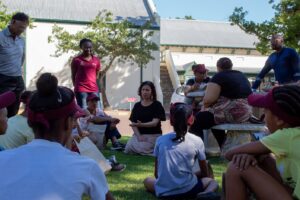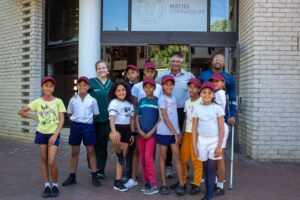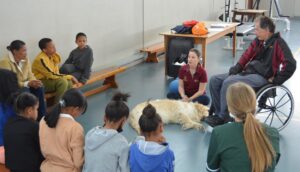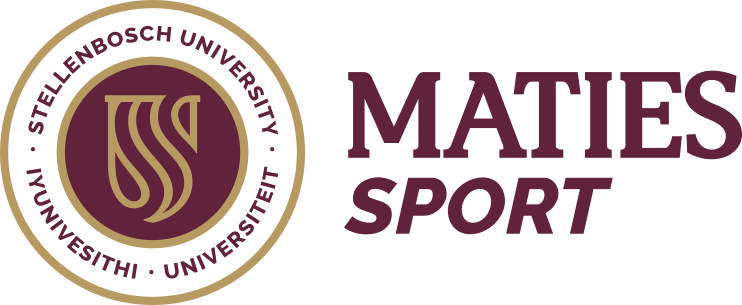By Maties Sport Media and Communication Unit
Learners from the Bishop Lavis community recently spent an exciting day touring various Stellenbosch University sports facilities. The event was part of a series of events run by the SLEAK social impact project, with each school term, having a dedicated theme.
The theme for this term’s events was “dream big”, according to Dr Nana Adom-Aboagye, the Acting Head at the Centre for Sport Leadership at Maties Sport, at Stellenbosch University.
The ongoing project aims to equip the learners from Bishop Lavis with life skills like resilience, determination, courage and self-belief. “Most importantly, it can teach young children about intrinsic motivation,” said Adom-Aboagye. She explained that “what they learn through sport, can be translated into other aspects of their lives”.
During their first visit on 4 October the programme focussed on “resilience”, using disability sport as the vehicle through which to teach this life skill. Learners joined for a game of goalball, a team sport designed specifically for athletes with a vision impairment. Learners also got a chance to try wheelchair basketball.
The initiative helps to expose children to various possibilities beyond the boundaries of their communities and what they know, said Adom-Aboagye.
A day in Stellenbosch
On 26 October, learners kicked off the afternoon’s festivities with a guided tour of the Stellenbosch Academy of Sport (SAS). This included the academy’s state of the art high performance gym, offices, medical rooms, conference centres and massage rooms.
Thereafter, they moved over to the Stellenbosch FC offices. During their visit, Stellenbosch FC player, Devin Titus, who also grew up in Bishop Lavis, shared his story and wisdom with the young visitors.
“The hope was that by meeting some professional athletes who look like them and maybe some who came from similar backgrounds as themselves, the learners would realise that it does not matter where you come from that dictates your life story,” said Adom-Aboagye.
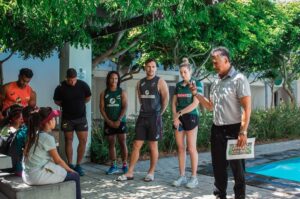
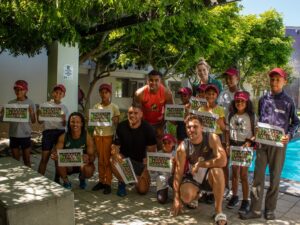
According to the learners present, their highlight of the day was meeting players from the Proteas national netball team, the Blitzbokke and Stellenbosch FC. “It was wonderful to see the kids spending a few moments with them, speaking to them and taking pictures with people that some of them have only seen on TV,” said Adom-Aboagye.
The learners also toured the Stellenbosch University soccer fields, Lentelus Futsal courts, Stellenbosch High Performance Centre and Coetzenburg Athletics Stadium.
“We hope to teach kids that when they dream big, what they dream can truly become their reality”, said Adom-Aboagye.
The history of SLEAK
The SLEAK programme is built on an existing project started in 2008 by the Division of Occupational Therapy, at Stellenbosch University’s (SU) Faculty of Medicine and Health Sciences, according to Maatje Kloppers from the Division of Occupational Therapy at SU.
In 2019, the Social Impact Division at SU piloted interfaculty collaboration on social impact projects, after which Maties Sport and the Faculty of Theology joined the initiative. ”We planned a SLEAK 2.0 version of the project for the benefit of learners, parents and community volunteers,” said Kloppers.
Due to COVID-19 the project was temporarily halted in 2020, before starting again with full force again at the end of 2021.
“The Division of Occupational Therapy, Maties Sport and the Faculty of Theology are ideal collaborators as they are able to offer learners a holistic growth opportunity. The Faculty of Theology assists with growth and support to the parents of the SLEAK learners, and Maties Sport exposes the children to the value that sport can add to your life”, said Kloppers.
According to Adom-Aboagye, they have received positive feedback from learners and caregivers currently in the programme. “They have seen changes in attitudes, improvement in school and how the children are staying away from trouble,” according to her.
In order for the SLEAK project to reach even more learners, they need even “greater support from the community”, says Adom-Aboagye. She encourages parents and guardians to reach out to the project and get involved in the project.
